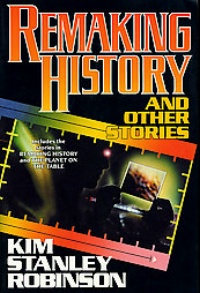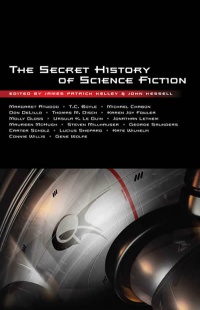History is a particle accelerator. Energies are not always normal. We live in a condition of asymptotic freedom, and every history is possible.
Title: Remaking History and Other Stories
Author: Kim Stanley Robinson
Year: 1991
Rating: 1/5 stars
 If you were to pick up a book by a known science fiction writer (Kim Stanley Robinson), from a known science fiction publisher (Tor), and with a title like Remaking History, would it not be reasonable to have some expectation of what you’d find in it? As for me, I somehow expected this to be a collection of alternate history stories, with maybe some time travel in the mix as well; that doesn’t seem like such a leap, does it? If you would make that leap, however, like I did, you’d be wrong. Not a single story in this volume fits that description in any strict sense. Of course, the author can’t really be blamed for my faulty assumption, so it’s not for that reason that I consider this collection a letdown. No, my disappointment has more to do with the fact that few of these stories entertained me much, or had much of importance to say; or that, when they did have something to say, the commentary was housed within narratives so dull I couldn’t be bothered to care. I was also, I admit, a little put off to find that about a third of the stories are not even science fiction, but what can only be considered “mainstream.”
If you were to pick up a book by a known science fiction writer (Kim Stanley Robinson), from a known science fiction publisher (Tor), and with a title like Remaking History, would it not be reasonable to have some expectation of what you’d find in it? As for me, I somehow expected this to be a collection of alternate history stories, with maybe some time travel in the mix as well; that doesn’t seem like such a leap, does it? If you would make that leap, however, like I did, you’d be wrong. Not a single story in this volume fits that description in any strict sense. Of course, the author can’t really be blamed for my faulty assumption, so it’s not for that reason that I consider this collection a letdown. No, my disappointment has more to do with the fact that few of these stories entertained me much, or had much of importance to say; or that, when they did have something to say, the commentary was housed within narratives so dull I couldn’t be bothered to care. I was also, I admit, a little put off to find that about a third of the stories are not even science fiction, but what can only be considered “mainstream.”
There is a “core” group of four stories that deal with history and at least partially justify the book’s title. “A History of the Twentieth Century, with Illustrations” seems to make the altogether underwhelming point that history may be portrayed in a more optimistic or pessimistic light depending on the life circumstances and mood of the historian writing the account. Yeah…. and? In “Remaking History,” a small group of filmmakers living in a future Lunar colony debate the Great Man Theory of History; the debate is short, shallow, and leaves much to be desired. “Vinland the Dream” deals with the topic of historical hoaxes, and asks if it truly matters what “really happened,” or if, rather, we should just view history as a “story.” Put me down as being in the former camp — I do care what really happened. The fourth story is more of an essay, titled “A Sensitive Dependence on Initial Conditions.” It’s the source of the quote at the top of this review, and it explores the intersection of quantum mechanics, chaos theory, and approaches to historical interpretation. It’s one of the more interesting parts of the book, actually.
Besides that essay, there were really only two stories I cared for at all. “Before I Wake” tackles the problem of a changing environment — an electromagnetic anomaly that blurs and mixes our waking and dreaming states — and asks if humanity would be able to adapt to it. (Bonus tip: read this story when you’re really, really tired for a trippier experience!) And “The Translator” is a hilarious story about the headaches and dangers involved in communicating with aliens.
I’m afraid I only have negative comments for the rest of the stories, so I’ll only mention a few of the more unsatisfactory ones. “Rainbow Bridge” falls prey to the all-too-common fantasy that Native Americans possess some sort of mystical powers or special wisdom, which is, of course, complete nonsense. “Glacier” paints a picture of a near-future world in which North America is becoming covered once again in ice — at a rate not too much slower than the weather disasters in the movie The Day After Tommorrow, apparently. The story focuses on the social impact, but gives no explanation for why American cities are being overtaken by glaciers in a period of just a few years. The remaining stories weren’t quite that annoying, but were, to varying degrees, simply boring.
Three out of fifteen is not too good. I guess I’ll have to put Robinson into that category of authors whose books I like, but whose short stories I don’t. Oh well, live and learn.















Kim Stanley Robinson is a kind of touchstone writer, hovering on the edge between hard sf and … erh, whatever hard sf isn’t. For me, his recent novels (Mars trilogy and Years of Rice and Salt in particular) have started with brilliant premises but somehow run them into the ground to the point where I can’t finish the books. I really want to like his stuff, but somehow it never works out.
I think I need to go back to his earliest novels and see if there’s something there that I’d really like.
I know he has a reputation as a rather literary, intellectual writer. And the one novel I’ve read, Icehenge, does live up to that. But most of these stories don’t. Not for me anyway. But hey, I’m hard to please when it comes to short stories, for some reason.
It was a few years ago when I read it, but my capsule summary of Rice & Salt is like this: All the Europeans are wiped out by plague, just as Zhingiz Khan’s hordes are about to invade leaving Asian, Indian, and Middle Eastern societies develop without interference. Three or four prototypical characters, including a trickster and a bookish scientist are reincarnated at various times to illustrate this development. And reincarnated. And reincarnated. And reincarnated. And reincarnated…at which point I dropped the book on the floor for a year. When I picked it up again, North American and Japanese cultures get added to the mix. Eventually our heroes are reincarnated to build a socialist village paradise in Davis, California.
The first chapters are fantastic, with new ideas and interesting progressions from the original premise coming in every chapter. It would have been brilliant if 1/2 or 1/3 were chopped out from the middle. But probably the publishers insisted on a thick enough spine to compete with the latest Wheel of Time novel on the shelf.
Sounds like I’ve got to try Icehenge.